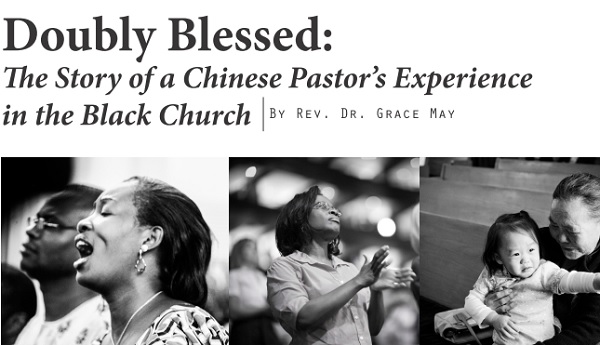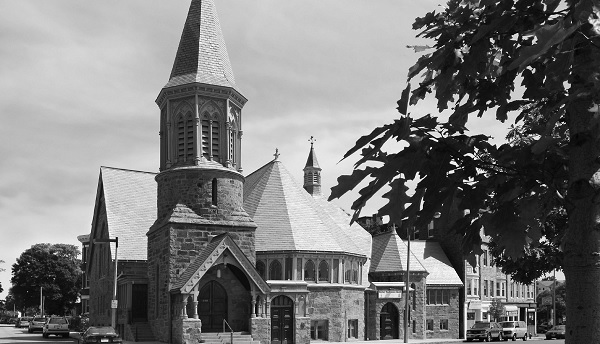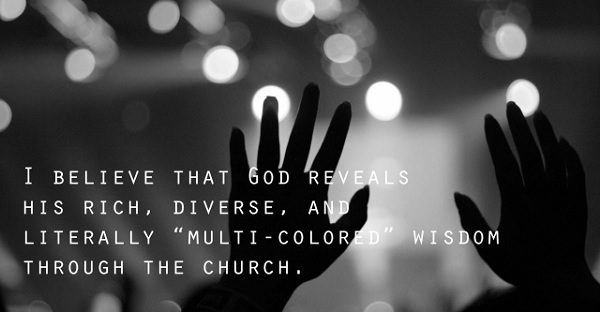Doubly Blessed:
The Story of a Chinese Pastor’s Experience in the Black Church
By Rev. Dr. Grace May

God has spoiled me.
I was raised in the Chinese church under the leadership and influence of sisters and brothers who made church the highlight of my week and my life. I was exposed to great preaching, prayer meetings, fellowship, Bible study, and summer and winter conferences. Sunday School teachers and fellowship counselors took me bird watching, treated me to my first live college football game, taught me to hand out tracts, made the Bible come alive for me, counseled me through difficulties, and gave me opportunities to lead. The Chinese church baptized me, discipled me, and cheered me on as I went to seminary.
It was at seminary, though, that God revealed to me a whole other side of his love. I learned how, from the time of Moses, God enacted laws to benefit widows, orphans, and resident aliens. During the period of the kings, the prophets decried both the moral degradation of Israel’s rulers and the abuses of government: corruption and bribery in the highest ranks, unfair land practices and onerous taxes. Even under the Roman Empire, the nascent church, a persecuted minority, found ways to begin challenging the evils of sexism, racism, and classism. I began to see that the same God who came to seek and save the lost longed to fix the very systems that contributed to people’s poverty and disenfranchisement. Just as the power of the gospel has set people free from sin, the same liberating Spirit has revived nations. While the theology was beginning to make sense to me, I wanted to see how God could use a church that I was a part of to bring about political transformation, economic empowerment, and social reform.

Recognizing the long history of social involvement in the black church in America, I joined the Roxbury Presbyterian Church (RPC), an African American church in Boston. Despite being the only non-black face in the pews, from the first passing of the peace, I felt welcome. People shook my hand, asked how I was doing, and embraced me. The worship at RPC was exuberant. Everything was sung with gusto from the hymns to the gospels and spirituals, which grew out of the time of unspeakable suffering and discrimination in America when blacks were treated like property and chattel. These songs draw from a deep reservoir of strength within and from a Savior well-acquainted with grief. Jesus allowed his back to be whiplashed, his beard to be torn from his face, and his body to be nailed on a wooden beam. The searing pain was surpassed only by the travesty of justice of framing an innocent man and executing him for a crime he didn't commit.
What black man or woman in the United States has not experienced the scourge of racism? Instead of letting anger and resentment fester or permitting oppressive systems to go unchecked, however, many Black churches have stood up, first, by praising the Son who stands at the right hand of the Father to advocate for his people, and secondly, by demanding accountability of human governments through political means and protests. Throughout its history, the Black church has served as a center and catalyst for social action by speaking up and exercising its influence in the public sphere. At RPC, we prayed regularly for the president, the government, and the world. Politicians regularly visited our church. The mayor called on the local black pastors for advice and counsel.
The Black church appreciates how the flourishing of the church and the neighborhood are inextricably tied together. Our church had a retired judge, a doctor, a teacher, a business owner, a scientist, and members who worked for the city of Boston. We also had families struggling with sickle cell anemia, addictions, and incarceration. My first internship at RPC focused on researching teen pregnancy and developing a partnership with a community health center to provide health care and education to young mothers. In our church, no matter what your background or career, you were expected to “give back” to the community. Isn't that the call of every Christian, to give back not only to our families but also to society in the form of service or advocacy?
Families are highly prized in African American culture. I remember one Sunday, when we were welcoming newcomers, a young ten-year-old boy, dressed in a tan suit and tie, stood up, introduced himself, and explained that he was visiting his grandparents. His parents, who were not in the room, had clearly groomed him, and he could not have been more articulate. Once a year, many Black families hold huge family reunions, involving extended family, many of whom will travel from all points of the compass to attend. Often a committee is formed for the sole purpose of planning a reunion with meetings ongoing throughout the year. A prayer partner of mine serves as the treasurer of her family reunions. In some households, adult sons or daughters call their mother daily just to say “I love you.”
Preaching that relates and inspires is the sine qua non of Black worship. The biblical text, themes, and narratives come alive with a rhythm and a cadence. Stories proliferate. Growing up, I enjoyed a similar style of preaching at evangelistic and revival services, but in the Black church, this is the weekly fare. The call and response style of preaching encourages people to spontaneously process their feelings out loud as the sermon is being delivered. This was quite a change from what I grew up with. An African American pastor and a mentor of mine was appointed to a Chinese church, where being quiet and listening attentively was the primary way to show respect to a speaker. After weeks of preaching, though, the pastor was dismayed because nobody was responding during the sermons. At a church retreat, the pastor mentioned that, in her tradition, listeners were expected to express their engagement with the message. The next day, as she preached, one by one, congregants held up handmade signs that read “Amen” and “Preach it!” Everyone including the pastor burst out laughing.

For the five years I was part of Roxbury Presbyterian Church, I was immersed in the African American expression of faith. I heard sermons at RPC that stirred my heart, stimulated my mind, and moved my will.
Lifting up hands, swaying to the music, loud applause, standing up, and going forward for prayer at the altar helped me come alive. In the process, the Lord lodged his love and truth deeper inside me, affirming my whole being—emotional, intellectual, physical, and spiritual. As I remember those days, I can still hear the voice of our pastor inviting us to the communion table, which he explained was not for those who are worthy but for those who need it—a reassuring word that filled me with relief and gratitude, for I don’t have to be good enough because Jesus is.
I believe that God reveals his rich, diverse, and literally “multi-colored” wisdom through the church (Eph. 6:10). Even before I started seminary, my desire was to pastor in a Chinese church, and the Lord granted that wish. After pastoring the Chinese Christian Church of New England, the First Chinese Presbyterian Church, and Oversea Chinese Mission, my heart longed to return to the black church, and the Lord opened the door for me three years ago by introducing me to Emmanuel Presbyterian Church, a predominantly African American church in the Lower East Side of Manhattan. Every week as Jesus meets us in our worship, in our altar calls, in our singing, in our prayers, in our Bible studies, and in our conversations, I’m in awe again of Christ who makes it all possible.
Stepping into the Black church ushers me into a world of freedom and acceptance, where I can openly recognize my need. I need patience and kindness. I need food and wine that money cannot buy. And in my great need, Jesus doesn’t hold back but, like the prodigal’s father, he chases me down and overtakes me with his love. Accepted and loved, I can then stretch out my arms to embrace our Father, who cannot be fully represented by any one group of people, but who is reflected in all of humanity.


 Rev. Dr. Grace Ying May is currently the Executive Director of Women of Wonder, Inc. (WOW!), a group committed to seeing sisters flourish in their God-given callings, and she is the pastor of Emmanuel Presbyterian Church, PC (USA). Born and raised in New York City, she enjoys residing in the Lower East Side with her mother and seeing the body of Christ in action all around the world.
Rev. Dr. Grace Ying May is currently the Executive Director of Women of Wonder, Inc. (WOW!), a group committed to seeing sisters flourish in their God-given callings, and she is the pastor of Emmanuel Presbyterian Church, PC (USA). Born and raised in New York City, she enjoys residing in the Lower East Side with her mother and seeing the body of Christ in action all around the world.